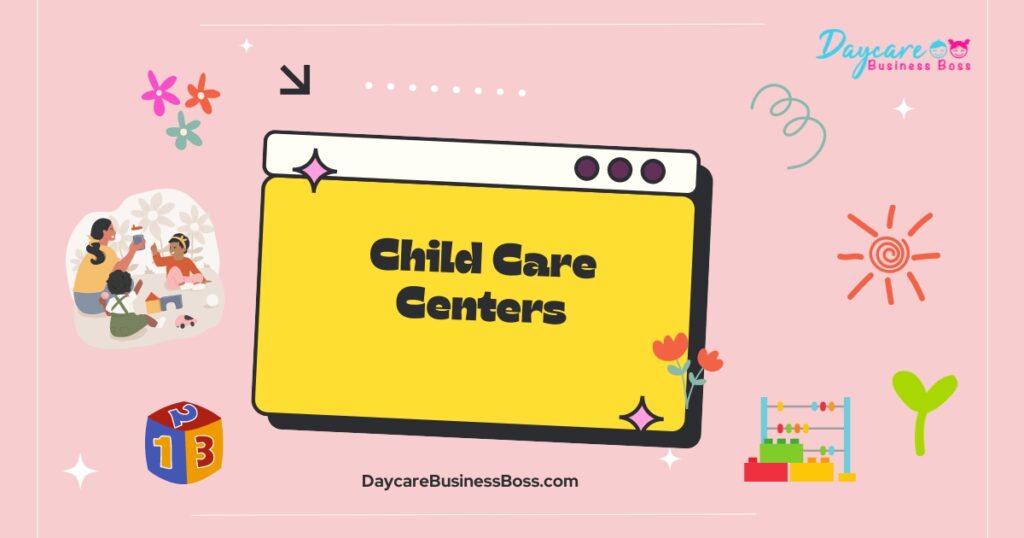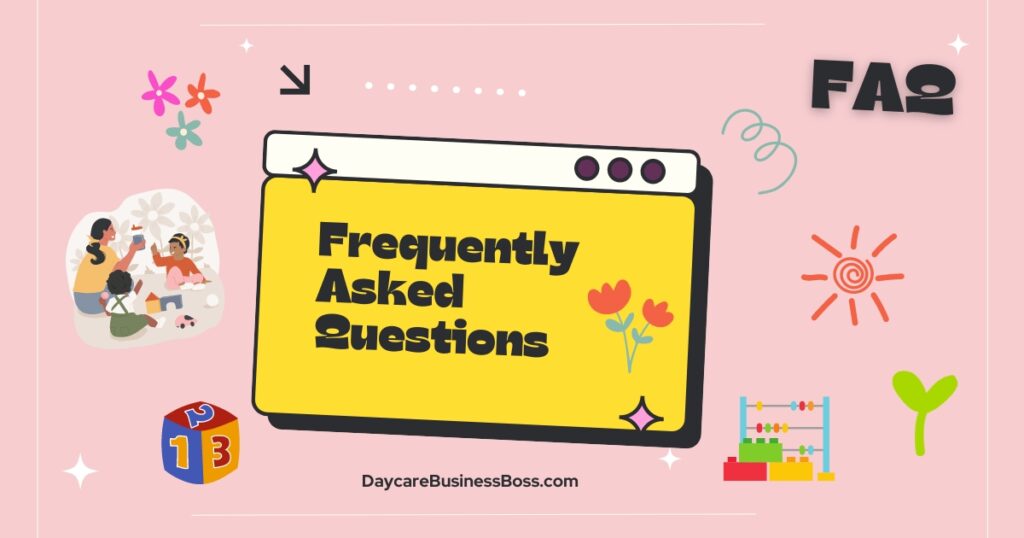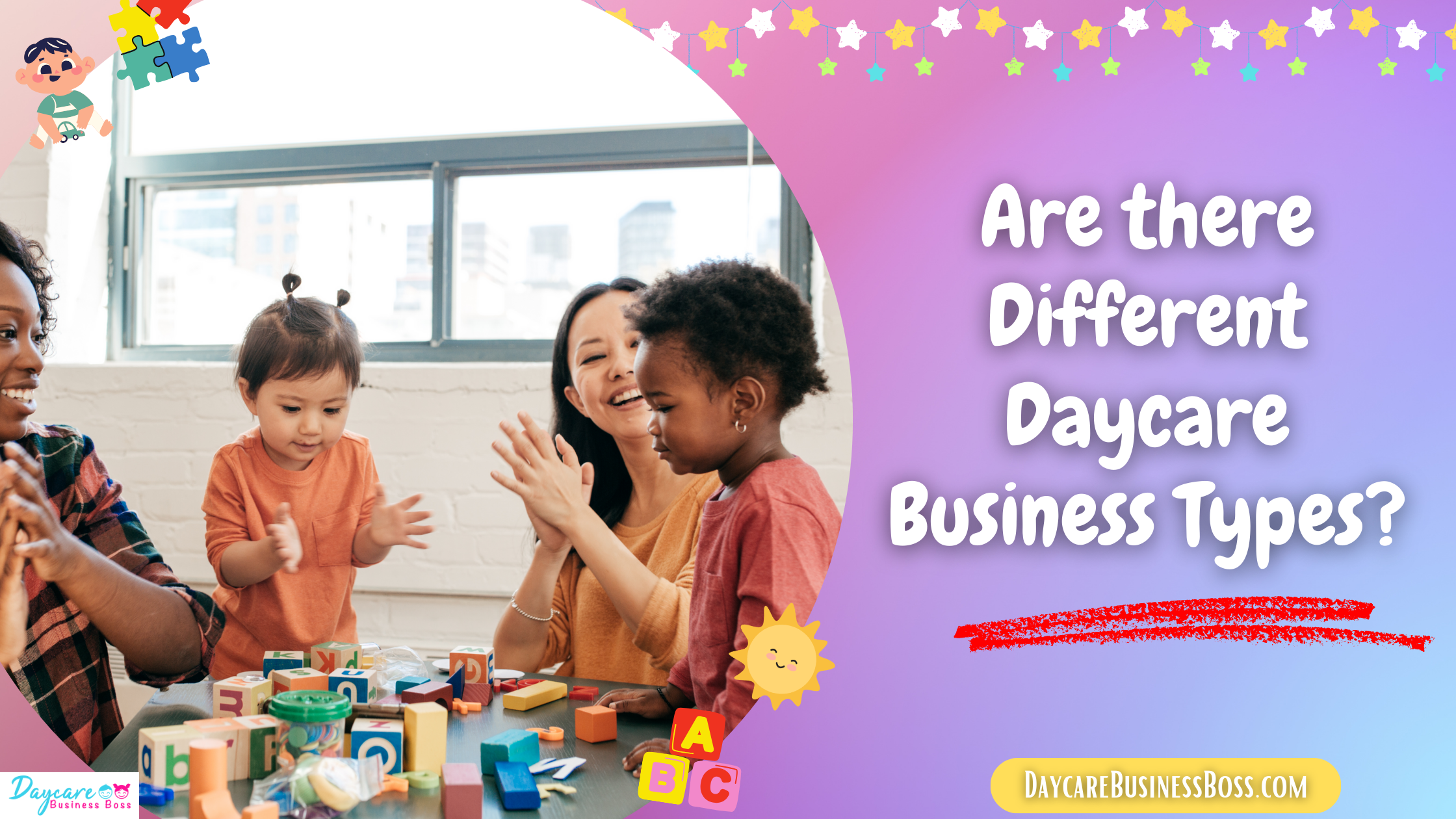The daycare industry is rapidly growing. This is due to a combination of both parents in the household working and due to the amount of single parenthood.
There are a few different daycare business types. There is the in-home daycare, the family, friend, and neighbor care, child care centers, non-profit centers, and franchise centers. Some daycare businesses may also provide either a preschool program and/or school-age programs.
Each daycare business type has the same concept, which is to care for children while parents work or attend school. Even though this is true, all daycare business types must adhere to all state regulations that are required by the state location of each center. Comprehensive insurance will be needed as well to operate a daycare center.
Types of Daycare Businesses
In-Home Daycares
In-home Daycare, also known as Family Child Care Homes, is a daycare business that is operated in a residential building. This type of daycare gives a home-like environment that allows for a close teacher to child bond. Some families choose an in-home daycare center over a center-based daycare because in-home daycares typically have low tuition rates.
In-home daycare centers have less expensive start-up costs because you are operating your daycare from your home. This is a result that you are not having to pay for commercial space and pay bills for the center.
If you have children, you are able to count your children along with all children you will be caring for in your in-home daycare center. You may also be eligible for grants to help with funding for things like food.
Family, Friend, and Neighbor Care
Family, friend, and neighbor care is typically provided in the child’s or caregiver’s home. This particular type of care is conducted by one person. The person caring for the child could be a relative, friend, or even a babysitter. Family, friend, and neighbor care is usually exempt from licensing and regulations, but be sure to verify the state regulations where you reside.
An example of this type of care is when someone hires a babysitter to care for a child while the parent or parents are at work. Babysitters are great, usually the most affordable. However, babysitters usually just tend to make sure the child is safe and getting fed. There is usually hardly any learning going on with babysitters.
Child Care Centers

A child care center is operated in a non-residential, or commercial building. This type of daycare has a school-like environment. With a structured schedule, a child care center is great for helping children to get into a strict routine. This is to prepare the children for when they attend preschool or school.
Even though a child care center typically has high tuition rates, many parents prefer to send their children to a child care center over an in-home daycare because they prepare the children for school. Child care centers usually have access to technology that will assist with the education curriculum.
A child care center is more expensive when it comes to start-up costs. However, it does allow you to keep your work separate from your home. Since a child care center is a bigger area, you are able to care for more children in your facility.
Non-profit Centers
It is common to find large and small non-profit daycare centers. Non-profit centers are eligible for federal, state, and private grants. Non-profit organizations do not pay federal or state income taxes.
However, non-profit centers should be registered as a corporation. Non-profit organizers must apply to the Internal Revenue Service (IRS) for non-profit status, according to Our Everyday Life.
Since non-profit organizations receive donations and grants, if ever a non-profit daycare center decides to close, the daycare cannot be sold and would not be able to sell its assets. It is required that non-profit daycares donate all unused or no longer needed assets.
Non-profit centers are usually in the form of a church. Personally, I have had experience with a non-profit daycare center. The daycare center was held at the church. I had originally chosen this daycare center because it was the only one that I could find in the area that was opened with my hours that I was required to work.
It actually cost me the same amount as the local daycare center, they provided services for my child from 8am-8pm. They assisted with his developmental skills, had retired teachers that were teaching, which meant that he was getting education while he was there, and allowed me to not stress about having to make sure he was picked up by a certain time.
Franchise Centers
Franchise centers help new business owners with a lot of the leg work. When you become a new business owner, there are a lot of decisions that need to be made to make sure your business is operated smoothly.
This is exactly what franchise centers are designed to accomplish. As a franchise owner, you still get to be your own boss. The difference is that you do not have to create policies or structures.
If you decide to open a franchise, you will get the benefit of not having to create a business plan. You can just simply use their business plan. Franchises also already have a design together for the business, down to the painting of the walls, which means once you have your commercial space, everything else just falls in place.
Programs Possibly Offered
Preschool Programs
There are some daycare centers that offer preschool programs. This program is designed to allow children to stay in an already familiar place while getting the education they would receive if they were enrolled in a preschool. Preschool programs give children the educational prep they need in order to start school.
This is beneficial to the parents because not only is his/her child taking preschool, but the child is already at the daycare center. The parent does not have to stress about having to leave work to go get their child from preschool to bring them to the daycare center so they can finish their shift.
Preschool programs tend to be seen mostly in commercial daycare centers. Depending on your state and local regulations, you may qualify to have a preschool program in your home daycare. Keep in mind that you would be required to have a licensed educator on site if you are not a licensed educator.
School-Age Programs
Some daycare centers offer school-age programs. This program is designed to help parents who have to work early mornings and/or late afternoons. This allows the child to have a safe environment before and/or after school hours.
Usually, there is a shuttle that is provided by the daycare that will take the children to school and pick them up after school. Also, the daycare center may provide an instructor who will tutor and/or help the children with their homework as well.
Whatever type of daycare business you plan to operate you may still qualify to run a school-age program. You will want to verify this with your state and local regulations. Keep in mind that parents will choose the best option that fits their family lifestyle. Some families may need an in-home daycare due to most daycare centers tend to close early in the evening.
Additional Information
Whichever type of daycare business you plan to operate must follow your state and local regulations. Areas that affected by those regulations are:
- License and Permits
- Teacher to Child Ratio
- Inspection Report (includes health and safety reports)
- Background Checks
- Insurance for the property, staff, and children
There are a few funding programs that your daycare business may qualify for or may offer to some of your clients. According to Government Grants, there are many grants that are offered for businesses and individuals.
Government Grants offers grants for home and small businesses. There are even grants for start up or expansion capital. They also offer grants for tuition assistance, child care, food and nutrition, and much more.
If you have children with disabilities that will attend your daycare center, you will need to adhere to the American with Disabilities Act (ADA). You will be required to make some adjustments if you have not already done so. Such adjustments include a wheelchair ramp and handrails. Keep in mind you may have parents with disabilities that may have to drop off or pick up their children as well.
Related Questions

- What is the difference between a public and private daycare center?
Just like you see public and private schools, there are public and private daycare centers. Private simply means that the center is privately owned, which is usually in the form of a church. This allows religious families to have religious teachings in their child(ren)’s daily routine.
- Is headstart considered as a daycare center?
Headstart is considered as a program that is designed for low-income families. Headstart programs promote school readiness from the ages of birth to five. These programs usually put into place in communities where it is more fitting.
Please note: This blog post is for educational purposes only and does not constitute legal advice. Please consult a legal expert to address your specific needs.
Looking to start your Daycare Business, look no further our startup course and documents are all you need to get started!

Meet Shawn Chun: Entrepreneur and Childcare Business Fan.
I’m a happy individual who happens to be an entrepreneur. I have owned several types of businesses in my life from a coffee shop to an import and export business to an online review business plus a few more and now I create online daycare business resources for those interested in starting new ventures. It’s demanding work but I love it. I do it for those passionate about their business and their goals. That’s why when I meet a childcare business owner, I see myself. I know how hard the struggle is to retain clients, find good employees and keep the business growing all while trying to stay competitive.
That’s why I created Daycare Business Boss: I want to help childcare business owners like you build a thriving business that brings you endless joy and supports your ideal lifestyle.


4 thoughts on “Are there Different Daycare Business Types?”
Comments are closed.